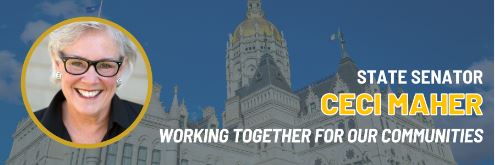May 4, 2024
SENATE PASSES BILL TO REVEAL JUNK FEES, ESTABLISH RIGHT TO REPAIR AND PROTECT CONSUMERS
Early this morning, State Senator Norm Needleman (D-Essex) joined the Senate’s vote to advance Senate Bill 3, moving significant advances in consumer protection one step closer to becoming law. The bill carries a number of improvements for consumers regarding broadband internet access, “junk fees” and the “right to repair,” as well as changes to statutes regarding drone purchasing and operations for municipal and state governments.
“This bill takes aim at significant consumer frustrations, from ensuring quality internet service statewide to ending the unwelcome surprise of ‘junk fees,'” said Sen. Needleman. “It’s a valuable piece of legislation that will make life easier in several small but significant ways.”
“Senate Bill 3 will end the deceptive concealment of junk fees, empowering individuals to make informed choices,” said Senate President Pro Tempore Martin M. Looney (D-New Haven). “Furthermore, by safeguarding the right to repair, this legislation will grant consumers autonomy over their possessions. In essence, this legislation heralds a new era of fairness that continues Connecticut’s leadership in putting consumers first.”
Senate Bill 3, ” An Act Concerning Consumer Protection,” would take a variety of steps including:
- Having the Office of Consumer Counsel study the merits, feasibility and means of ensuring digital equity and quality broadband Internet service access for residents statewide, including guaranteeing minimum speeds for access and requiring comparable capacities for all subscribers to a broadband internet service
- Having the Department of Consumer Protection develop a “Net Equality Program” that would seek to ensure that at least 90% of Connecticut households have affordable broadband internet service access by 2025 and 95% by 2028, with a maximum monthly cost established by July 2025 with minimum speeds of 25 MB/s download and 3MB/s upload
- Seeking to end “junk fees” by preventing businesses to display prices to consumers that exclude fees, charges or costs, or that intentionally misrepresent fees to mislead individuals, with exceptions for taxes and mandatory gratuities
- Preventing any producer of internet-connected audio listening devices (such as Google Home or Amazon Echo/Alexa) from selling recordings or data collected from listening, also preventing them from eavesdropping on consumers without their knowledge.
- Preserving the “right to repair,” where individual consumers can perform repairs to their own electronic devices and appliances instead of being required to receive repairs from a specific producer or manufacturer
- Preventing purchases of drones manufactured or assembled in China or Russia by state departments, state agencies, state municipalities or businesses entering a contract with state agencies or departments.
Many of these actions are intended to directly protect consumers. Expansions and efforts to support broadband internet access in the state will help ensure all state residents, including low-income households, aging populations, people with disabilities, underserved demographics and rural communities, can keep up with modern internet demands. As of last year, more than 10,000 homes and small businesses in Connecticut, and as many as hundreds of thousands of state residents, do not have access to high-speed internet.
Efforts to fight junk fees will match the federal government’s; the Biden administration has worked to reduce and repeal hidden fees and predatory price advertisements for several years. They also build on 2023 Connecticut legislative work to ban hidden fees on tickets to live events, which went into place last year.
Revelations that producers of listening devices have eavesdropped and even sold information collected from user data have caused controversy in recent years. Amazon paid a fine to the Federal Trade Commission for eavesdropping on consumers while Cox admitted in an earnings call that it monetized data it collected from user data with targeted advertisements.
Enshrining the right to repair will build on efforts already started by other states including California to prevent electronics and appliance manufacturers from monopolizing repair markets of their products, supporting small businesses and members of the public.
Banning drones manufactured in China and Russia would work to counter potential relaying of data from drones back to their countries of origin; the FBI has warned these drones can represent “significant risk” to critical infrastructure in the United States.
Prior to today’s passage in the Senate, the bill passed the Judiciary Committee on April 22 by a 24-11 vote and the General Law Committee on March 12 by a 14-8 vote. It now goes to the House for further consideration. |













